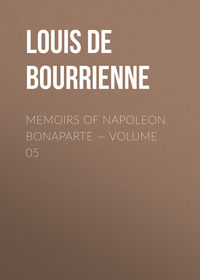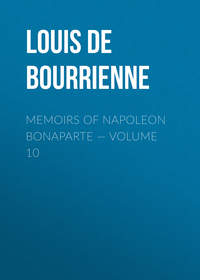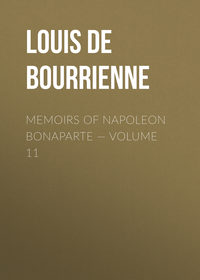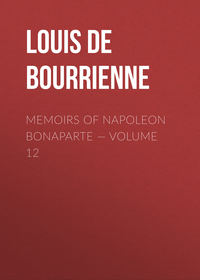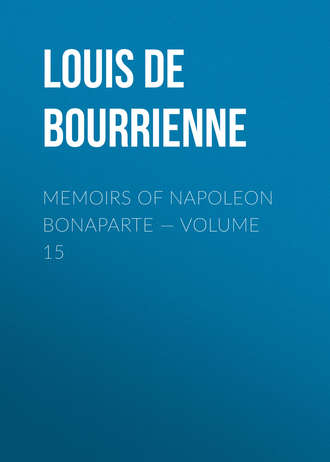 полная версия
полная версияMemoirs of Napoleon Bonaparte — Volume 15
I conceived it to be my duty to make the King acquainted with this conversation, and as there was now no Comte de Blacas to keep truth and good advice from his Majesty's ear, I was; on my first solicitation, immediately admitted to, the Royal cabinet. I cautiously suppressed the most startling details, for, had I literally reported what Fouche said, Louis XVIII. could not possibly have given credit to it. The King thanked me for my communication, and I could perceive he was convinced that by longer retaining Fouche in office he would become the victim of the Minister who had been so scandalously forced upon him on the 7th of July. The disgrace of the Duke of Otranto speedily followed, and I had the satisfaction of having contributed to repair one of the evils with which the Duke of Wellington visited France.
Fouche was so evidently a traitor to the cause he feigned to serve, and Bonaparte was so convinced of this,—that during the Hundred Days, when the Ministers of the King at Ghent were enumerated in the presence of Napoleon, some one said, "But where is the Minister of the Police?"
"E-h! Parbleu," said Bonaparte, "that is Fouche?" It was not the same with Carnot, in spite of the indelible stain of his vote: if he had served the King, his Majesty could have depended on him, but nothing could shake the firmness of his principles in favour of liberty. I learned, from a person who had the opportunity of being well informed, that he would not accept the post of Minister of the Interior which was offered to him at the commencement of the Hundred Days until he had a conversation with Bonaparte, to ascertain whether he had changed his principles. Carnot placed faith in the fair promises of Napoleon, who deceived him, as he had deceived others.
Soon after my audience with the King I set off to discharge my duties in the department of the Yonne, and I obtained the honour of being elected to represent my countrymen in the Chamber of Deputies. My colleague was M. Raudot, a man who, in very trying circumstances, had given proofs of courage by boldly manifesting his attachment to the King's Government. The following are the facts which I learned in connection with this episode, and which I circulated as speedily as possible among the electors of whom I had the honour to be President. Bonaparte, on his way from Lyons to Paris, after his landing at the gulf of Juan, stopped at Avalon, and immediately sent for the mayor, M. Raudot. He instantly obeyed the summons. On coming into Napoleon's presence he said, "What do you want, General? "This appellation displeased Napoleon, who nevertheless put several questions to M. Raudot, who was willing to oblige him as a traveller, but not to serve him as an Emperor. Napoleon having given him some orders, this worthy servant of the King replied, "General, I can receive no orders from you, for I acknowledge no sovereign but the King, to whom I have sworn allegiance." Napoleon then directed M. Raudot, in a tone of severity, to withdraw, and I need not add that it was not long before he was dismissed from the mayoralty of Avalon.
The elections of the Yonne being over, I returned to Paris, where I took part in public affairs only as an amateur, while waiting for the opening of the session. I was deeply grieved to see the Government resort to measures of severity to punish faults which it would have been better policy to attribute only to the unfortunate circumstances of the times. No consideration can ever make me cease to regret the memory of Ney, who was the victim of the influence of foreigners. Their object, as Blucher intimated to me at St. Cloud, was to disable France from engaging in war for a long time to come, and they hoped to effect that object by stirring up between the Royal Government and the army of the Loire that spirit of discord which the sacrifice of Ney could not fail to produce. I have no positive proofs of the fact, but in my opinion Ney's life was a pledge of gratitude which Fouche thought he must offer to the foreign influence which had made him Minister.
About this time I learned a fact which will create no surprise, as it affords another proof of the chivalrous disinterestedness of Macdonald's character. When in 1815 several Marshals claimed from the Allied powers their endowments in foreign countries, Madame Moreau, to whom the King had given the honorary title of 'Madame la Marechale', and who was the friend of the Duke of Tarentum, wrote, without Macdonald's knowledge, to M. de Blacas; our ambassador at Naples, begging him to endeavour to preserve for the Marshal the endowment which had been given him in the Kingdom of Naples. As soon as Macdonald was informed of this circumstance he waited upon Madame Moreau, thanked her for her kind intentions, but at the same time informed her that he should disavow all knowledge of her letter, as the request it contained was entirely averse to his principles. The Marshal did, in fact, write the following letter to M. de Blacas:—"I hasten to inform you, sir, that it was not with my consent that Madame Moreau wrote to you, and I beg you will take no step that might expose me to a refusal. The King of Naples owes me no recompense for having beaten his army, revolutionised his kingdom, and forced him to retire to Sicily." Such conduct was well worthy of the man who was the last to forsake Napoleon in, 1814, and the first to rejoin him, and that without the desire of accepting any appointment in 1815. M. de Blacas, who was himself much surprised at Macdonald's letter, communicated it to the King of Naples, whose answer deserves to be recorded. It was as follows:—"If I had not imposed a law upon myself to acknowledge none of the French endowments, the conduct of Marshal Macdonald would have induced me to make an exception in his favour." It is gratifying to see princes such scrupulous observers of the laws they make for themselves!
About the end of August 1815, as I was walking on the Boulevard des Capucines, I had the pleasure of meeting Rapp, whom I had not seen for a long time. He had just come out of the house of Lagrenee, the artist, who was painting his portrait. I was on foot, and Rapp's carriage was waiting, so we both stepped into it, and set off to take a drive in the Bois de Boulogne. We had a great deal to say to each other, for we had not met since the great events of the two Restorations. The reason of this was, that in 1814 I passed a part of the year at Sens, and since the occurrences of March 1815 Rapp himself had been absent from Paris. I found him perfectly resigned to his change of condition, though indulging in a few oaths against the foreigners. Rapp was not one of those, generals who betrayed the King on the 20th of March. He told me that he remained at the head of the division which he commanded at Ecouen, under the orders of the Due de Berry, and that he did not resign it to the War Minister until after the King's departure. "How did Napoleon receive you?" I inquired. "I waited till he sent for me. You know what sort of fellow I am: I know nothing about politics; not I. I had sworn fidelity to the King. I know my duty, and I would have fought against the Emperor."—"Indeed!"—"Yes, certainly I would, and I told him so myself."—"How! did you venture so far?"—"To be sure. I told him that my resolution was definite. 'Pshaw! . . . replied he angrily. 'I knew well that you were opposed to me. If we had come to an action I should have sought you out on the field of battle. I would have shown you the Medusa's head. Would you have dared to fire on me?'—'Without doubt,' I replied. `Ah! parbleu this is too much,' he said. 'But your troops would not have obeyed you. They had preserved all their affection for me.'—'What could I do?' resumed I. 'You abdicated, you left France, you recommended us to serve the King—and then you return! Besides; I tell you frankly, I do not augur well of what will happen. We shall have war again. France has had enough of that.' Upon this," continued Rapp, "he assured me that he had other thoughts; that he had no further desire for war; that he wished to govern in peace, and devote himself solely to the happiness of his people. When I hinted opposition on the part of the Foreign Powers, he said that he had made alliances. He then spoke to me of the King, and I said I had been much pleased with him; indeed, the King gave me a very gratifying reception on my return from Kiow, and I see no reason why I should complain, when I am so well used. During the conversation the Emperor much extolled the conduct of the Duke of Orleans. He then gave me some description of his passage from the Isle of Elba and his journey to Paris. He complained of being accused of ambition; and observing that I looked astonished and doubtful—`What?' he continued, 'am I ambitious then?' And patting his belly with both his hands, 'Can a man,' he asked, 'so fat as I am be ambitious?' I could not for my soul help saying, 'Ah! Sire, your Majesty is surely joking.' He pretended, however, to be serious, and after a few moments, noticing my decorations, he began to banter me about the Cross of St. Louis and the Cross of the Lily, which I still wore."
I asked Rapp whether all was true that had been said about the enthusiasm which was manifested along the whole of Napoleon's route from the Gulf of Juan to Paris. "Ma foe!" he replied, "I was not there any more than you, but all those who accompanied him have assured me of the truth of the details which have been published; but I recollect having heard Bertrand say that on one occasion he was fearful for the safety of the Emperor, in case any assassin should have presented himself. At Fossard, where the Emperor stopped to breakfast on his way to Paris, his escort was so fatigued as to be unable to follow, so that he was for some time almost alone on the road, until a squadron which was in garrison at Melun met him and escorted him to Fontainebleau. As to anything else, from all I have heard, the Emperor was exposed to no danger."
We then began to talk of our situation, and the singular chances of our fortune. Rapp told me how, within a few days only, he had ceased to be one of the discontented; for the condition of the generals who had commanded army corps in the campaign of Waterloo was very different in 1815 from what it had been in 1814. "I had determined," he said, "to live a quiet life, to meddle with nothing, and not even to wear my uniform. I had, therefore, since the King's return never presented myself at Court; when, a week ago, while riding on horseback two or three hundred paces from this spot, I saw a group of horsemen on the other side of the avenue, one of whom galloped towards me. I immediately recognised the Duc de Berry, 'How, Monseigneur, is it you?' I exclaimed. 'It is, my dear General; and since you will not come to us, I must come to you. Will you breakfast with me tomorrow morning?'—'Ma foi!" continued Rapp, "what could I do? The tone of kindness in which he gave this invitation quite charmed me. I went, and I was treated so well that I shall go again. But I will ask for nothing: I only want these Prussians and English rascals out of the way! "I complimented Rapp on his conduct, and told him that it was impossible that so loyal and honest a man as he should not, at some time or other, attract the King's notice. I had the happiness to see this prediction accomplished. Since that time I regularly saw Rapp whenever we both happened to be in Paris, which was pretty often.
I have already mentioned that in the month of August the King named me Councillor of State. On the 19th of the following month I was appointed Minister of State and member of the Privy Council. I may close these volumes by relating a circumstance very flattering to me, and connected with the last-mentioned nomination. The King had directed M. de Talleyrand to present to him, in his official character of President of the Council of Ministers, a list of the persons who might be deemed suitable as members of the Privy Council. The King having read the list, said to his Minister, "But, M. de Talleyrand, I do not see here the names of two of our best friends, Bourrienne and Alexis de Noailles."—" Sire, I thought their nomination would seem more flattering in coming directly from your Majesty." The King then added my name to the list, and afterwards that of the Comte Alexis de Noailles, so that both our names are written in Louis XVIII.'s own hand in the original Ordinance.
I have now brought to a conclusion my narrative of the extraordinary events in which I have taken part, either as a spectator or an actor, during the course of a strangely diversified life, of which nothing now remains but recollections.
—[I discharged the functions of Councillor of State until 1818, at which time an Ordinance appeared declaring those functions Incompatible with the title of Minister of State—Bourrienne.]—
CHAPTER XII.
THE CENT JOURS
The extraordinary rapidity of events during the Cent fours, or Hundred Days of Napoleon's reign in 1815, and the startling changes in the parts previously filled by the chief personages, make it difficult to consider it as an historical period; it more resembles a series of sudden theatrical transformations, only broken by the great pause while the nation waited for news from the army.
The first Restoration of the Bourbons had been so unexpected, and was so rapidly carried out, that the Bonapartists, or indeed all France, had hardly realized the situation before Napoleon was again in the Tuileries; and during the Cent Jours both Bonapartists and Royalists were alike rubbing their eyes, asking whether they were awake, and wondering which was the reality and which the dream, the Empire or the Restoration.
It is both difficult and interesting to attempt to follow the history of the chief characters of the period; and the reader must pardon some abrupt transitions from person to person, and from group to group, while the details of some subsequent movements of the Bonaparte family must be thrown in to give a proper idea of the strange revolution in their fortunes. We may divide the characters with which we have to deal into five groups,—the Bonaparte family, the Marshals, the Statesmen of the Empire, the Bourbons, and the Allied Monarchs. One figure and one name will be missing, but if we omit all account of poor, bleeding, mutilated France, it is but leaving her in the oblivion in which she was left at the time by every one except by Napoleon.
The disaster of 1814 had rather dispersed than crushed the Bonaparte family, and they rallied immediately on the return from Elba. The final fall of the Empire was total ruin to them. The provisions of the Treaty of Fontainebleau, which had been meant to ensure a maintenance to them, had not been carried out while Napoleon was still a latent power, and after 1815 the Bourbons were only too happy to find a reason for not paying a debt they had determined never to liquidate it was well for any of the Bourbons in their days of distress to receive the bounty of the usurper, but there was a peculiar pleasure in refusing to pay the price promised for his immediate abdication.
The flight of the Bonapartes in 1815 was rapid. Metternich writes to Maria Louisa in July 1815: "Madame Mere and Cardinal Fesch left yesterday for Tuscany. We do not know exactly where. Joseph is. Lucien is in England under a false name, Jerome in Switzerland, Louis at Rome. Queen Hortense has set out for Switzerland, whither General de Flahault and his mother will follow her. Murat seems to be still at Toulon; this, however, is not certain." Was ever such an account of a dynasty given? These had all been among the great ones of Europe: in a moment they were fugitives, several of them having for the rest of their lives a bitter struggle with poverty. Fortunately for them the Pope, the King of Holland, and the Grand-Duke of Tuscany, were not under heavy obligations to Napoleon, and could thus afford to give to his family the protection denied them by those monarchs who believed themselves bound to redeem their former servility.
When Napoleon landed Maria Louisa was in Austria, and she was eager to assist in taking every precaution to prevent her son, the young King of Rome, being spirited off to join his father, whose fortunes she had sworn to share: She herself was fast falling under the influence of the one- eyed Austrian General, Neipperg, just then left a widower, who was soon to be admitted to share her bed. By 1823 she seemed to have entirely forgotten the different members of the Bonaparte family, speaking of her life in France as "a bad dream." She obtained the Grand-Duchy of Parma, where she reigned till 1847, marrying a third time, it is said, the Count Bombellea, and dying, just too soon to be hunted from her Duchy by the Revolution of 1848.
There is something very touching in most that we know of the poor young King of Rome, from his childish but strangely prescient resistance to his removal from Paris to Blois on the approach of the Allies in 1814, to the message of remembrance sent in after years to the column of the Place Vendome, "his only friend in Paris."
At four years of age Meneval describes him as gentle, but quick in answering, strong, and with excellent health. "Light curly hair in ringlets set off a fresh face, while fine blue eyes lit up his regular features: He was precociously intelligent, and knew more than most children older than himself." When Meneval—the former secretary of his father, giving up his post in Austria with Maria Louisa, as he was about to rejoin Napoleon—took farewell of the Prince in May 1815, the poor little motherless child drew me towards the window, and, giving me a touching look, said in a low tone, "Monsieur Meva, tell him (Napoleon) that I always love him dearly." We say "motherless," because Maria Louisa seems to have yielded up her child at the dictates of policy to be closely guarded as easily as she gave up her husband. "If," wrote Madame de Montesquiou, his governess, "the child had a mother, I would leave him in her hands, and be happy, but she is nothing like a mother, she is more indifferent to his fate than the most utter stranger in her service." His grandfather, the Emperor Francis, to do him justice, seems to have been really kind to the lad, and while, in 1814, 1816, and in 1830, taking care to deprive him of all chance of, his glorious inheritance, still seems to have cared for him personally, and to have been always kind to him. There is no truth in the story that the Austrians neglected his education and connived at the ruin of his faculties. Both his tutor, the Count Maurice Dietrichstein, and Marshal Marmont, who conversed with him in 1831, agree in speaking highly of him as full of promise: Marmont's evidence being especially valuable as showing that the Austrians did not object to the Duke of Reichstadt (as he had been created by his grandfather in 1818), learning all be could of his father's life from one of the Marshals. In 1831 Marment describes him: "I recognised his father's look in him, and in that he most resembled Napoleon. His eyes, not so large as those of Napoleon, and sunk deeper in their sockets, had the same expression, the same fire, the same energy. His forehead was like that of his father, and so was the lower part of his face and his chin. Then his complexion was that of Napoleon in his youth, with the same pallor and the same colour of the skin, but all the rest of his face recalled his mother and the House of Austria. He was taller than Napoleon by about three inches." `
As long as the Duke lived his name was naturally the rallying-point of the Bonapartes, and was mentioned in some of the many conspiracies against the Bourbons. In 1830 Joseph Bonaparte tried to get the sanction of the Austrians to his nephew being put forward as a claimant to the throne of France, vacant by the flight of Charles X., but they held their captive firmly. A very interesting passage is given in the 'Memoirs of Charles Greville', who says that Prince Esterhazy told him a great deal about the Duke of Reichstadt, who, if he had lived, would have probably played a great part in the world. He died of a premature decay, brought on, apparently, by over-exertion and over-excitement; his talents were very conspicuous, he was 'petri d'ambition', worshipped the memory of his father, and for that reason never liked his mother; his thoughts were incessantly turned towards France, and when he heard of the Days of July (overthrow of Charles X.) he said, "Why was I not there to take my chance? He evinced great affection and gratitude to his grandfather, who, while he scrupulously observed all his obligations towards Louis Philippe, could not help feeling a secret pride in the aspiring genius of Napoleon's son. He was well educated, and day and night pored over the history of his father's glorious career. He delighted in military exercises, and not only shone at the head of his regiment, but had already acquired the hereditary art of ingratiating himself with the soldiers." Esterhazy went on to describe how the Duke abandoned everything at a ball when he met there Marshals Marmont and Maison." He had no eyes or ears but for them; from nine in the evening to five the next morning he devoted himself to these Marshals." There was the true Napoleonic ring in his answer to advice given by Marmont when the Duke said that he would not allow himself to be put forward by the Sovereigns of Europe. "The son of Napoleon should be too great to serve as an instrument; and in events of that nature I wish not to be an advanced guard, but a reserve,—that is, to come as a succour, recalling great memories."
His death in 1832, on the 22d of July, the anniversary of the battle of Salamanca, solved many questions. Metternich visited the Duke on his deathbed: "It was a heartrending sight. I never remember to have seen a more mournful picture of decay." When Francis was told of the death of his grandson he answered, "I look upon the Duke's death as a blessing for him. Whether it be detrimental or otherwise to the public good I do not know. As for myself, I shall ever lament the loss of my grandson."
Josephine was in her grave at Rueil when Napoleon returned. She had died on the 29th of May 1814, at Malmaison, while the Allies were exhibiting themselves in Paris. It seems hard that she should not have lived to enjoy a triumph, however brief, over her Austrian rival. "She, at least," said Napoleon truly, "would never have abandoned me."
Josephine's daughter, Hortense, separated from her husband, Louis Bonaparte, and created Duchess of St Leu by Louis XVIII., was in Paris, much suspected by the Bourbons, but really engaged in a lawsuit with her husband about the custody of her sons. She had to go into hiding when the news of the landing arrived, but her empty house, left unwatched, became very useful for receiving the Bonapartists, who wished for a place of concealment, amongst them, as we shall see, being, of all people, Fouche! Hortense was met by Napoleon with some reproaches for accepting a title from the Bourbons, but she did the honours of the Elysee for him, and it is creditable to both of them that, braving the vile slanders about their intercourse, she was with him to the end; and that one of the last persons to embrace him at Malmaison before he started for the coast was his adopted daughter, the child of his discarded wife. Hortense's presence in Paris was thought to be too dangerous by the Prussian Governor; and she was peremptorily ordered to leave. An appeal to the Emperor Francis received a favourable answer, but Francis always gave way where any act against his son-in-law was in question, and she had to start at the shortest notice on a wandering life to Aix, Baden, and Constance, till the generosity of the small but brave canton of Thurgau enabled her to get a resting-place at the Chateau of Arenenberg.
In 1831 she lost her second son, the eldest then surviving, who died from fever in a revolutionary attempt ill which he and his younger brother, the future Napoleon. III., were engaged. She was able to visit France incognita, and even to see Louis Philippe and his Queen; but her presence in the country was soon thought dangerous, and she was urged to leave. In 1836 Hortense's last child, Louis Napoleon, made his attempt at an 'emeule' at Strasburg, and was shipped off to America by the Government. She went to France to plead for him, and then, worn out by grief and anxiety, returned to Arenenberg, which her son, the future Emperor, only succeeded in reaching in time to see her die in October 1837. She was laid with Josephine at Rueil.



